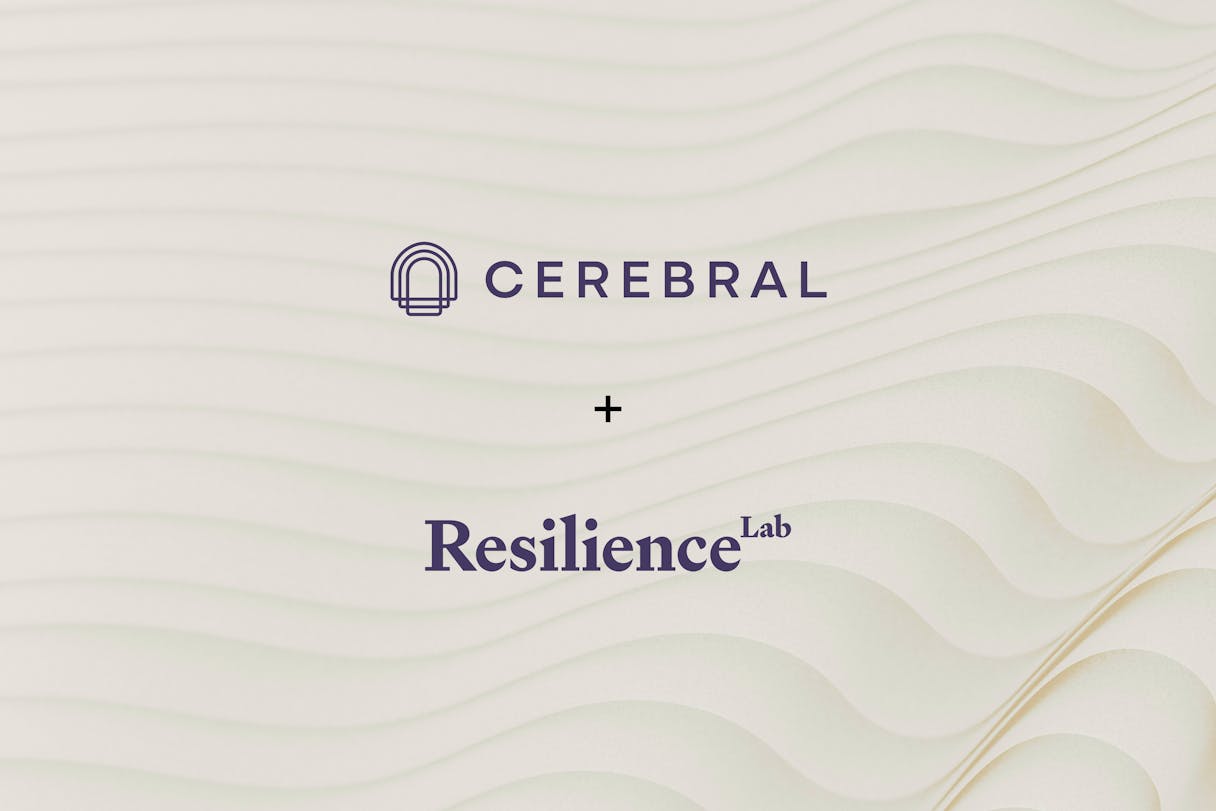Browse Mental Health Prescribers available in New Jersey
There are 6 Cerebral prescribers serving New Jersey
Are you covered by insurance?
We work with a select group of insurance providers to help cover the cost of your services. Check to see if you can save with insurance.
You may also like

Aug 4, 2025
In the News
Therapy
Our Care: The Resilience Methodology
Mental health that builds relief today and resilience tomorrow Quality, consistency, and lifelong skills Choosing a mental health care provider can be one of the most challenging parts of getting started — especially online. It can be difficult to compare important aspects of treatment like quality, experience, access, insurance, and more.
Mental health can also be difficult to measure, but knowing your therapist or prescriber has a solid plan for your improvement can help give structure to your time together.
That’s why we developed the Resilience Methodology — a comprehensive framework for mental health that makes it easier for you and your clinician to set goals and make meaningful progress together. 5 pillars of the Resilience Methodology Compatibility Working with a clinician who understands you is one of the most important parts of making progress in your mental health. We have a pool of over 600 diverse, trained, and vetted therapists and prescribers to make it easier to find the right fit on the first try. And we make it easy to choose a new clinician anytime throughout your treatment for any reason. Collaboration You’re an active part of your treatment. You and your therapist or prescriber will work together to identify goals that are meaningful to you and the steps you’ll take to work toward them. This process also helps you know what to expect along your journey and take note of the progress you’re making together. Coordination Your clinician will ask questions to help them understand all contributing factors of your mental health and how to address the root causes. We also make it easy to add or switch services so you can access therapy, medication, or both whenever it’s appropriate. Your clinicians can also share notes to understand the full context of your journey and provide you with consistent care. Personalization Each person has their own history and health. Our priority is understanding who you are and creating a custom treatment plan tailored to your needs. We also encourage you to be as open and honest with your clinician about how your treatment is working for you so you can make adjustments together as needed. Measurement Mental health can be difficult to measure. We use standardized mental health assessments like PHQ-9, GAD-7, and WHOQOL to help you set goals with your clinician, understand trends over time, and identify changes when they happen. The results of these assessments don’t define who you are — they give additional insight into how you’re feeling, progress you’ve made, and milestones you’ve achieved. How it works 1. We'll get to know each other Your journey starts with an intake session with your therapist or prescriber. They'll ask you some questions about your experience, why you're seeking support, and any symptoms you may be experiencing. The focus is on understanding you and your experiences, goals, and challenges.
If you choose to meet with a prescriber, they may determine a diagnosis and prescribe medication if it's appropriate. 2. You'll get a personalized plan Your clinician will make a personalized treatment plan tailored to your needs and work with you to set goals. Your treatment plan is a roadmap for your mental health journey, complete with milestones and check-ins with your therapist and/or prescriber. You can always talk to your clinician about how your plan is working and make any necessary adjustments along the way. 3. Keep track of your progress You'll continue to meet with your therapist and/or prescriber as necessary, and take assessments along the way to help keep track of how you’re doing. You can always talk to your clinician about how your plan is working, and work with them to make any necessary adjustments along the way. You can also message your clinician between sessions if you have questions or need extra support. What sets us apart More than just a patient Our clinicians truly care to know you as a person — not just a patient. We prioritize creating a diverse pool of clinicians to help you find someone who can relate to your experience and make you feel comfortable. We also make it easy to switch therapists or prescribers at any time for any reason — no phone calls or emails necessary. You can see all available options right from your account and book a session with whoever fits your needs and schedule. Coordinated care made easy Sign up once and get access to high quality therapy, medication management, or both. No long wait times, figuring out insurance, or waiting for a referral. And your clinicians can share notes to make sure you’re getting consistent, meaningful care across treatment programs. It’s easy to switch or add services anytime throughout your treatment to help you get support when you need it. More than just relief Our approach isn’t made to just manage your symptoms or feel better in the short term. We built our framework based on real clinical evidence and guidance to help every client develop long-term skills for the future. Our goal is to give you relief now, and tools for life. Ready to get started? Whatever you’re going through, we have clinicians ready to listen and support you. Find a therapist or prescriber here.
Read more

Aug 4, 2025
In the News
Therapy
A New Era of Mental Healthcare: How Cerebral Is Expanding High-Quality, Personalized Care
We’re excited to announce that Cerebral has acquired Resilience Lab, a behavioral health organization known for its outcomes-focused care model and pioneering clinician development platform. This acquisition marks a major milestone in our mission to deliver high-quality, integrated mental healthcare. By joining forces, we’re combining Cerebral’s national reach and operational strength with Resilience Lab’s proven methodology and training infrastructure—ensuring clients receive consistent, personalized care from a deeply supported network of clinicians. Why it’s important to raise the standard of care Access to mental health support has increased in recent years—but access alone isn’t enough. For care to truly make a difference, it has to be consistent, personalized, and rooted in evidence-based practices. That’s why Cerebral is investing in what matters most: clinical quality. By acquiring Resilience Lab, we’re taking a major step toward delivering on our mission to provide exceptional mental healthcare with real, lasting results. What this means for clients Cerebral and Resilience Lab are now one team, working together under the Cerebral brand. What makes this partnership so impactful is that it solves two of the biggest challenges in the industry: Fragmented care
Traditionally, clients see separate providers for therapy and psychiatric care, with little coordination between them. That fragmentation can slow progress or lead to gaps in treatment. Cerebral’s integrated model brings therapists and prescribers together on the same care team. Providers collaborate in real time, making shared treatment decisions and adjusting care as needed. Inconsistent outcomes
Everyone deserves high-quality care, no matter who they see. Resilience Lab focuses on developing and empowering early-career clinicians and providing them with supervised training rooted in clinical best practices. They recognize that care is rooted in your relationship with your clinician, and establishing that trust is everything. That means more reliable, effective support for clients—and a stronger mental health workforce. What makes the Resilience Methodology different? Resilience Lab’s approach is unique because it prioritizes both clinical excellence and clinician wellbeing. Here’s how it works: Structured development for early-career therapists and prescribers
Clinicians are trained in a rigorous, evidence-informed method that prioritizes therapeutic alliance, ongoing feedback, and personalized care. Support to prevent burnout and turnover
The clinician experience is central. With better training, support, and supervision, therapists are more equipped to stay engaged and grow in their careers—benefiting both clients and the broader system. Measurement-informed care
Clinical decisions are guided by real-time progress tracking, which helps tailor treatment to each client’s unique needs and goals. In short, clients benefit from care that is grounded in data, backed by training, and focused on building lasting resilience, not just symptom relief. Why this matters for the future of mental health Cerebral serves more than 100 million commercial insurance members nationwide. With this acquisition, we’re scaling a clinician-centered, outcomes-driven model that will help transform how mental healthcare is delivered across the country. “Our mission is to set a new standard for the quality of integrated mental health care,” said Brian Reinken, CEO of Cerebral. “We’re combining Cerebral’s operational scale and breadth with Resilience Lab’s clinical rigor to become a true center of excellence.” Seeking out professional support Whether you’re managing anxiety, burnout, or simply navigating life’s challenges, quality care makes all the difference. At Cerebral, our therapists and prescribers work together to support your mental health journey, offering personalized treatment, real-time collaboration, and if needed, medication delivery right to your door. We’re proud to welcome Resilience Lab to our team as we continue our commitment to helping you feel your best, today and in the future. Ready to take the next step? Learn more and get started at www.cerebral.com
Read more

Apr 24, 2025
Self-care
6 Self-Care Tips for Stress and Burnout Recovery
When stress weighs heavily on your shoulders or burnout leaves you feeling emotionally and physically drained, self-care becomes crucial. But if the idea of setting aside time for activities like making a skincare routine or fitting in a workout feels like an uphill battle, you’re in the right place. While these moments of relaxation may be valuable, true self-care can simply start with a shift in mindset. In this article, we’ll explore stress and burnout and provide six actionable tips to help you change your perspective and begin prioritizing self-care. {MiniWidget:Anxiety} Why it’s important to relieve stress Stress is a natural reaction to pressure, but when left unchecked, it can take a toll on your mental and physical health. Chronic stress is associated with anxiety, depression, muscle tension, and even cardiovascular disease. By learning to manage stress effectively, you can improve your overall quality of life and foster resilience in the face of challenges. What is burnout? Burnout is a state of emotional, mental, and physical exhaustion caused by prolonged and excessive stress. It often occurs when you feel overwhelmed, emotionally drained, and unable to meet constant demands. Over time, burnout can diminish your sense of accomplishment and leave you feeling detached or unfulfilled. Common symptoms include fatigue, lack of motivation, and changes in sleep patterns. While often associated with work-related stress, burnout can also stem from other areas of life, such as parenting or personal relationships, making it crucial to recognize and address early signs. Six tips for meaningful self-care Self-care begins with a shift in mindset – a deliberate effort to support your wellbeing and realign your priorities. Below are six lesser-discussed yet impactful self-care tips to help you rediscover balance. 1. Shift the narrative on value Sometimes we unknowingly create internal narratives that influence how we handle stress and perceive ourselves. Are you telling yourself that you’re only valuable when you're productive or that asking for help makes you weak? This narrative can perpetuate burnout. Challenge them by identifying these thoughts and replacing them with compassionate, truthful affirmations. For example, instead of “I should be able to handle everything,” you can tell yourself, “It’s okay to need support. It doesn’t make me less capable.” 2. Set boundaries without guilt Burnout often stems from an excess of demands, whether from work, family, or society at large. Meaningful self-care involves learning to say “no” with confidence. Practice by identifying your limits and communicating them with clarity and kindness. If you find yourself feeling guilty after saying no, remember that setting boundaries isn’t selfish. It’s essential for preserving your mental and emotional health. Think about it this way – when you say yes to everything, you deplete your energy and lose time for what truly matters to you. 3. Relish the quiet moments We live in a world that tends to glorify busyness, but constant motion can leave you feeling overwhelmed. Instead of filling every free moment with scrolling on your phone or aiming to be productive, intentionally create moments of stillness. This might mean sitting quietly with your thoughts, savoring a warm cup of tea, or watching the sunset without distractions. Stillness can give you the mental clarity to reset and reconnect with your values. 4. Learn to celebrate small wins Burnout often makes us focus exclusively on what’s left undone, which might leave us feeling inadequate. A meaningful act of self-care is to celebrate your small victories – whether it’s completing a single task, cooking yourself a nourishing meal, or even getting out of bed on a particularly hard day. Acknowledging progress, no matter how small, reinforces a sense of achievement and shifts your focus to the positive. 5. Reconnect with your inner values Burnout can sometimes stem from neglecting what truly matters to you, and instead, prioritizing the needs of others. Devote time to reflecting on what is most important to you. What brings you joy? Then, take actionable steps to weave those values back into your everyday life. For instance, if creativity energizes you, set aside time, even just 10-20 minutes a day, for painting or writing. Aligning your actions with your core values can bring fulfillment and counter feelings of emptiness. 6. Practice intentional gratitude Gratitude can help ground you and remind you of the good things in your life, even during difficult times. It doesn't mean ignoring life's challenges. If you're not into list-making, try focusing on one thing each day that you're truly grateful for. It could be a comforting hug, a kind word from a stranger or loved one, or the sound of rain. Savoring these moments can help reframe your perspective. Seeking out professional support While self-care is an essential part of managing stress and preventing burnout, the support of a skilled mental health professional could make all the difference. Cerebral offers compassionate clinicians ready to listen and create personalized treatment plans to help you address challenges like burnout, chronic stress, anxiety, and depression. Remember, prioritizing your mental health isn’t something you have to do alone. We’re here to empower you with the tools and care you need to feel your best. Join Cerebral today! *Based on Cerebral clients with moderate to severe anxiety and/or depression from 2020-2023. Image by RF._.studio _ on Pexels.
Read more
Finding the right
therapist for you...
Finding the right therapist for you...
Cerebral therapists come from a range of backgrounds and have different approaches to treatment. You can find someone who matches your preferences, such as ethnicity, gender, specialties such as LGBTQIA+ and more.
Learn more about therapyPeople commonly search for...
Prescribers in CaliforniaPrescribers in ConnecticutPrescribers in DelawarePrescribers in District of ColumbiaPrescribers in GeorgiaPrescribers in IdahoPrescribers in IllinoisPrescribers in KansasPrescribers in MarylandPrescribers in MontanaPrescribers in NebraskaPrescribers in NevadaPrescribers in New MexicoPrescribers in New YorkPrescribers in OhioPrescribers in OklahomaPrescribers in OregonPrescribers in TexasPrescribers in VermontPrescribers in Wisconsin